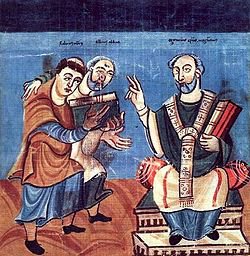 Saint Rabanus (c. 780-4 Feb. 856), a Benedictine monk, theologian, exegete, poet, abbot and archbishop of Mainz, called the "teacher of Germany." Rabanus studied under Alcuin who gave him the name of "Maurus." He authored De rerurm naturis (On the Nature of Things), De laudibus sanctae Crucis but he's most known for his composition of "Veni Creator Spiritus," the beautiful hymn we sing at Pentecost and any time we pray to the Holy Spirit.
Saint Rabanus (c. 780-4 Feb. 856), a Benedictine monk, theologian, exegete, poet, abbot and archbishop of Mainz, called the "teacher of Germany." Rabanus studied under Alcuin who gave him the name of "Maurus." He authored De rerurm naturis (On the Nature of Things), De laudibus sanctae Crucis but he's most known for his composition of "Veni Creator Spiritus," the beautiful hymn we sing at Pentecost and any time we pray to the Holy Spirit.As Pope Benedict XVI reminded us when thinking about Saint Rabanus, he is "an extraordinary awareness of the need to involve not only the mind and heart in the experience of faith, but also the senses." Rabanus was instructive in showing us how to use the "aesthetic taste and human sensitivity which bring man to benefit from the truth with all of himself: spirit, soul and body."
For Benedict said, "I believe that Rabanus Maurus also speaks to us today. Whether immersed in the frenetic rhythms of work or on holiday, we must reserve time for God. We must not forget Sunday as the day of the Lord and the day of the liturgy, in order to see --in the beauty of our churches, of sacred music, and of the Word of God-- the beauty of God Himself, and allow it to enter own being. Thus our lives become great, they become true life.
Ultimately from Saint Rabanus we learn that "We must search for God in all the dimensions of our being."
The 2001 Roman Martyrology lists Rabanus as a saint while other sources list him as a blessed. Saint Rabanus is recognized as a holy bishop and scholar, and a confessor of the faith.


Leave a comment